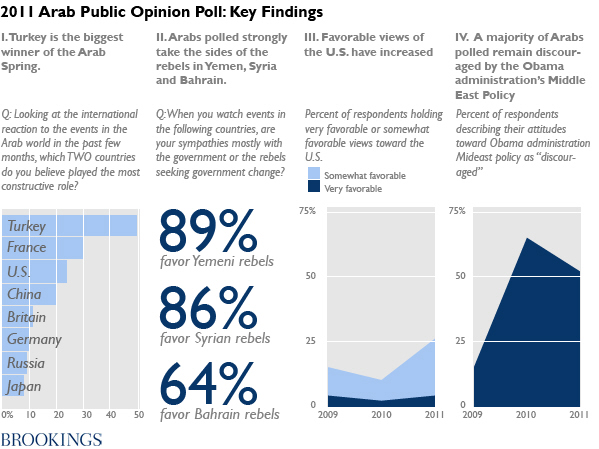On Monday, November 21, Shibley Telhami, Anwar Sadat Professor for Peace and Development at the University of Maryland and nonresident senior fellow at the Saban Center for Middle East Policy at Brookings, released the 2011 Arab Public Opinion Poll, which is produced each year in conjunction with Zogby International.
This year’s poll surveyed 3,000 people in Egypt, Morocco, Jordan, Lebanon, and the United Arab Emirates in October 2011, assessing attitudes toward the United States and the Obama administration, prospects for Arab-Israeli peace, the impact of the Arab awakening, the outlook for the Egyptian elections, and opinions on where the region is headed politically.
Get audio, video and a transcript from the launch event »

The Arab Spring
- Turkey is the biggest winner of the Arab Spring. In the five countries polled, Turkey is seen to have played the “most constructive” role in the Arab events. Its prime minister, Recep Erdoğan, is the most admired among world leaders, and those who envision a new president for Egypt want the new president to look most like Erdoğan. Egyptians want their country to look more like Turkey than any of the other Muslim, Arab and other choices provided.
- Iran suffered mixed results. More people in 2011 identify Iran as one of the two biggest threats they face than ever before (18%), and, in contrast with 2010, a plurality (35%) of those polled now believe that if Iran acquires weapons of mass destruction it would be negative for the Middle East. On the other hand, Iran’s president, Mahmoud Ahmadinejad, remains relatively popular, and most (64%) Arabs still feel that Iran has the right to its nuclear program and should not be pressured by the international community to halt it.
- Although France remains relatively popular, it has suffered a major setback in Arab public opinion in comparison with the past several years. While 23% said they preferred France if there were only one superpower in 2009, this has dropped to only 10% This was also matched by a decline in the number of people who want to live in France (from 36% in 2009 to 28% in 2011). This appears to be related to the fact that Arabs are divided on the issue of the international intervention in Libya: A plurality of Arabs in the five countries polled (46%) say that, in retrospect, the international intervention was a mistake, although there is variation from country to country.
- Overall, Arabs polled strongly take the sides of the rebels against the government in Yemen (89%), Syria (86%), and Bahrain (64%). But there are regional differences: Those polled in the UAE mostly favor the government of Bahrain. The Lebanese are divided on Syria, the Jordanians are divided on Bahrain, and the Egyptians’ support for the rebels in Bahrain is weaker than their support for the rebels in Yemen and Syria.
- A majority of those polled (55%) are more optimistic about the future of the Arab world in light of the Arab Spring, 16% are pessimistic and 23% feel no change. A majority feel that the Arab Spring is mostly about “ordinary people seeking dignity, freedom and a better life,” while 19% believe it is about foreign powers trying to stir trouble in the region and 16% feel it is about opposition parties or sects seeking to control governments.
The United States
- While a majority of Arabs polled continue to express unfavorable views of the United States (59%) the number of those who have favorable views of the US has increased from 10% in 2010 to 26% in 2011. This improvement could be related to the perception of the American handling of the Arab Spring, as 24% of those polled identified the US as one of the two countries they believe played the most constructive role in the Arab Spring.
- A majority of Arabs polled (52%) remain discouraged by the Obama administration policy in the Middle East, though this is down from 65% in 2010 and up from only 15% in 2009. A plurality of those polled (43%) have negative views of President Obama while 34% have positive views. This constitutes an improvement from 2010 for Obama, but a decline from 2009.
- When asked about the two steps by the United States that would improve their views of the US the most, 55% said an Israeli-Palestinian peace agreement and 42% said stopping aid to Israel.
The Egyptian Elections
Note that these polls measure trends but not necessarily likely voting behavior. There is little information on the central issue of likely voters and little precedence. At the local level, Egyptians vote often on the basis of family/clan loyalty, personality, or other factors that trump ideology.
- A plurality of Egyptians (43%) believe that the military rulers are working to slow or reverse the gains of the revolution, while only 21% believe that they are working to advance these gains, and 14% believe that the military authorities are indifferent.
- Roughly a third of Egyptians say they are likely to vote for an Islamic party in the Parliamentary elections.
- Of the Egyptian Presidential candidates, Amr Mousa receives the support of 21% of those polled, followed by Muhammad ElBaradei and Ahmad Shafiq.
The Arab-Israeli Issue
- A majority of Arabs polled (675) continue to say that they’re prepared for peace with Israel based on a two state solution along the 1967 borders. At the same time, a majority (53%) say that such a solution will never happen. Yet a majority (54%) also believes that if the two state solution is no longer on the table, this will lead to a state of intense conflict for years to come.
- Only 20% of those polled believe that a solution to the conflict will come through negotiations (down from 40% in 2010). While 39% believe it will come by being imposed be either the United Nations or the United States and 20% say it will come through another war.
- Egyptians are divided on the peace treaty with Israel, with 37% supporting maintaining it, while 35% support cancelling it. The number of supporters increases to 41% if Israel agrees to a Palestinian state.
Media
- Aljazeera Television continues to be identified as the number one source of international news among those polled (53%) followed by Al-Arabiya (14%) and MBC (12%).
- There is a marked increase in the percentage of Arabs who identify the Internet as their main source of international news, with 20% saying that the Internet is their primary source of international news, in contrast to 8% in 2009.
- The use of the Internet continues to expand rapidly, with over a quarter of users saying they acquired access only in the past year, while a total of over 40% say they’ve acquired use over the past three years.
The Brookings Institution is committed to quality, independence, and impact.
We are supported by a diverse array of funders. In line with our values and policies, each Brookings publication represents the sole views of its author(s).




